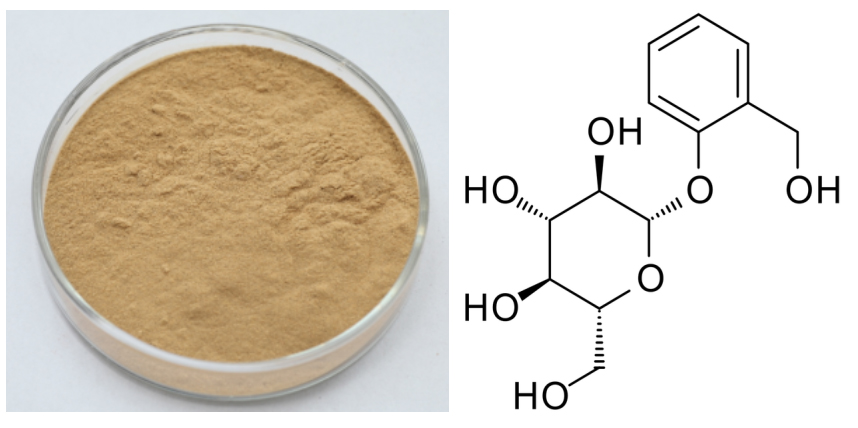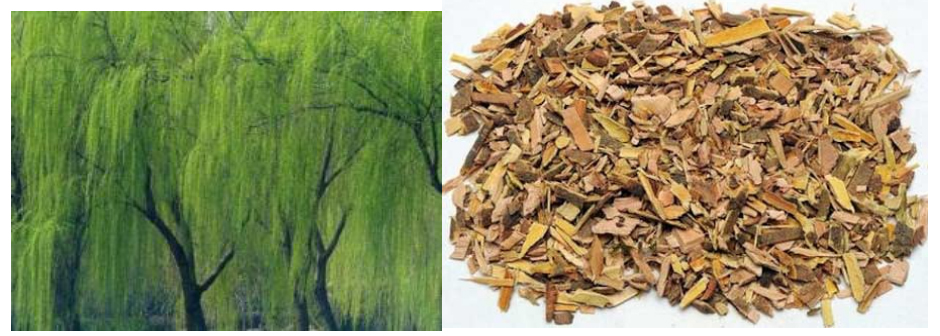Massive Selection for White Willow Bark Extract Factory from European
Massive Selection for White Willow Bark Extract Factory from European Detail:
[Latin Name] Salix alba L.
[Plant Source] from China
[Specifications] Salicin 15-98%
[Appearance] Yellow Brown to White powder
Plant Part Used: Bark
[Particle size] 80 Mesh
[Loss on drying] ≤5.0%
[Heavy Metal] ≤10PPM
[Storage] Store in cool & dry area, keep away from the direct light and heat.
[Shelf life] 24 Months
[Package] Packed in paper-drums and two plastic-bags inside.
[Net weight] 25kgs/drum
Brief Introduction
Salicin is a naturally occurring compound found in the bark of several species of trees, primarily North American in origin, that are from the willow, poplar, and aspen families. White willow, from whose Latin name, Salix alba, the term salicin is derived, is the most well known source of this compound, but it is found in a number of other trees, shrubs, and herbaceous plants as well being synthesized commercially. It is a member of the glucoside family of chemicals and is used as an analgesic and antipyretic. Salicin is used as a precursor for the synthesis of salicylic acid and acetylsalicylic acid, commonly known as aspirin.
A colorless, crystalline solid in its pure form, salicin has the chemical formula C13H18O7. Part of its chemical structure is equivalent to the sugar glucose, meaning it is classified as a glucoside. It is soluble, but not strongly so, in water and alcolhol. Salicin has a bitter taste and is a natural analgesic and antipyretic, or fever reducer. In large quantities, it can be toxic, and overdoses may lead to liver and kidney damage. In its raw form, it may be mildly irritating to skin, respiratory organs, and eyes.
Function
1. Salicin is used to ease pain and reduce inflammation.
2. Relieve acute and chronic pain, including headache, back and neck pain, muscle aches, and menstrual cramps; Control arthritis discomforts.
3. Relieve acute and chronic pain.
4. It has the same effect on the body as aspirin without any of the side effects.
5. It is an anti-inflammatory, a fever reducer, an analgesic, an anti-rheumatic, and an astringent. Specifically, it helps to relieve headaches.
Application
1.Anti-inflammatory, anti-rheumatic,
2.Reduce a fever,
3.Use as an analgesic and astringent,
4.Relieve headache,
5.Ease pain caused by rheumatism, arthritis, and carpal tunnel syndrome.
Product detail pictures:
Related Product Guide:
Sticking towards the principle of "Super High-quality, Satisfactory service" ,We've been striving to become a superb business partner of you for Massive Selection for White Willow Bark Extract Factory from European , The product will supply to all over the world, such as: India, Nairobi, Slovakia, We sincerely hope to cooperate with customers all over the world, if you would like to have more information, make sure you kindly contact us, we have been looking forward to building up a great business relationship with you.
How to add more protein and nutrition to your daily intake as well as make your other powders and Plant Protein/Superfood Powders go Further and last longer. See below links for the full nutritional values of the Seeds and look for my upcoming video on “Seeds, Plant Protein and Superfood Powders” to assist you further. Enjoy, Love Christopher
Be sure to scroll each page to see entire nutritional profile.
Pumpkin Seeds
https://nutritiondata.self.com/facts/nut-and-seed-products/3141/2
Sunflower Seeds
https://nutritiondata.self.com/facts/nut-and-seed-products/3079/2
Poppy Seeds
https://nutritiondata.self.com/facts/spices-and-herbs/203/2
Raw Hemp
https://nutritiondata.self.com/facts/custom/629104/2
https://www.purehealingfoods.com/hempHeartsAnalysis.php
Nome científico
Ginkgo biloba L.
Nomes alternativos
Ginkgo, nogueira-do-japão, ginkgoácea.
Descrição
Originária da Ásia, é uma das plantas mais conhecidas em todo o mundo. Além de estar presente de forma ornamental nas grandes cidades por sua resistência à poluição e outros agressores ambientais, há registros mostrando que vem sendo usada como medicamento desde 2600 a.C.
A árvore pode atingir 35m de altura e suas folhas verdes em formato de pequenos leques ficam amarelas no outono. As sementes são amarelas quando maduras e emitem um odor desagradável. Uma árvore de Ginkgo pode viver mais de mil anos e alguns exemplares sobreviveram à explosão da bomba atômica de Hiroshima em 1945 no Japão.
Parte utilizada
Folhas.
Uso medicinal
É indicada no tratamento sintomático de insuficiência cerebrovascular (vertigens, dor de cabeça, zumbidos, perda de memória, dificuldade de concentração, depressão emocional), comprometimento da microcirculação (doença de Raynaud, parestesias, formigamentos), problemas do ouvido interno e vertigem de origem vascular.
Modos de uso
Chá das folhas, cápsulas, comprimidos, extratos e na produção de fitoterápicos como Binko, Bioflavin, Clibium, Dinaton, Equitam, Fito Biloba, Ginbiloba, Gincobem, Gincolin, Ginkan, Gingkomenil, Tanakan, Tebiloba, Tebonin e Tekasan.
Cuidados e contraindicações
Deve ser usado com cuidado por pacientes tomando anticoagulantes, ibuprofeno ou outras plantas como alho, gengibre e salgueiro. O consumo de folhas frescas deve ser evitado, pois podem conter substâncias que causam forte alergia, mas que são removidas durante os processos industriais ou de manipulação.
Efeitos colaterais
Dor de cabeça, desconforto abdominal ou alergias de pele.
The factory technical staff not only have high level of technology, their English level is also very good, this is a great help to technology communication.






